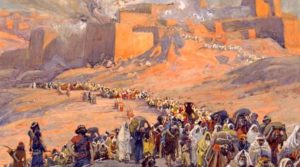This week’s parasha, Vayechi, begins with Jacob’s blessing to his grandsons, Menashe and Ephraim. Since Menashe is older, his father Joseph makes sure to place him on Jacob’s right. This way, Jacob can place his superior right hand on Menashe, and give him the special blessing reserved for the firstborn. However, Jacob crosses over his arms and lays his right hand on the head of Ephraim. Joseph protests and reminds his father who is the elder son: “Not so, father, for this one is the firstborn; put your right hand on his head.” (Genesis 48:18) Jacob replies: “I know, my son, I know; he too will become a people, and he too will be great. But his younger brother will be greater than he…”
Traditionally, it is understood that the special blessing given to Ephraim would lead to his future rise in leading the Kingdom of Israel. Ephraim became the most populous tribe, and the seat of the powerful northern kingdom’s dynasty. Yet, a careful reading suggests we have the order mixed up. It appears that Ephraim did not become great because Jacob gave him a blessing; rather, Jacob gave him a blessing because he would become great! Jacob told Joseph that he is placing his right hand on Ephraim because the “younger brother will be greater”. That means Jacob foresaw Ephraim’s rise to greatness, and blessed him accordingly.
This might seem trivial, but it is of immense importance. It begs the question: Do the events of today cause the events of tomorrow, or are all the events from past to future already predetermined? Was it Jacob’s blessing that made Ephraim great, or was Ephraim already destined for greatness and Jacob—foreseeing it prophetically—just brings that fact to light? If the latter is the case, what purpose does the blessing even serve? Ephraim would be great regardless! It leads us to the bigger free will dilemma: If we have complete power to choose, and our decisions cause the events of tomorrow, then how can God (or His prophets) foresee the future? How could Jacob see Ephraim’s future greatness if Ephraim had yet to make those choices that led him to greatness? If he was going to be great anyway, did he really have a choice? Continue reading

